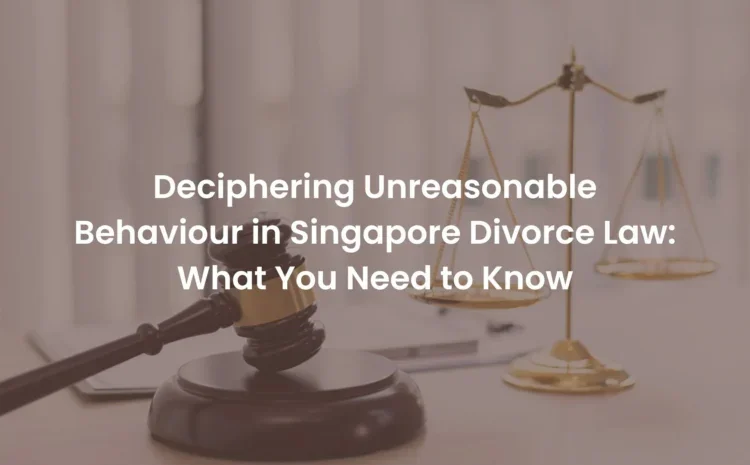Deciphering Unreasonable Behaviour in Singapore Divorce Law: What You Need to Know
Navigating divorce proceedings can be emotionally and legally complex, especially when it comes to proving grounds for divorce. In Singapore, one such ground is unreasonable behaviour. But what exactly constitutes unreasonable behaviour in Singapore divorce law? In this blog post, we’ll explore this concept, understand its implications, and shed light on what evidence is needed to substantiate claims of unreasonable behaviour.
Understanding Unreasonable Behaviour
Unreasonable behaviour, also known as “irretrievable breakdown of marriage” due to the respondent’s unreasonable conduct, is one of the key grounds for divorce in Singapore under the Women’s Charter. It refers to conduct by one spouse that makes it intolerable for the other spouse to continue living with them. This behaviour can take various forms and is assessed based on the subjective perception of the petitioner.
Examples of Unreasonable Behaviour
Unreasonable behaviour can encompass a wide range of behaviors, including but not limited to:
Physical or verbal abuse
Persistent neglect of household duties or financial responsibilities
Substance abuse or addiction
Emotional or psychological manipulation
Adultery (though it can also be cited as a separate ground for divorce)
Refusal to communicate or reconcile differences
Controlling or coercive behavior
It’s important to note that what constitutes unreasonable behaviour may vary from case to case and is ultimately determined by the court based on the evidence presented.
Evidence Required
Proving unreasonable behaviour in a divorce case requires presenting sufficient evidence to demonstrate that the respondent’s conduct has indeed made it intolerable for the petitioner to continue living with them. While direct evidence such as eyewitness testimony or recordings of abusive behavior can be compelling, the court also considers circumstantial evidence and the overall context of the marriage.
Some common types of evidence that may be presented include:
Affidavits or written statements from the petitioner detailing instances of unreasonable behavior.
Witness statements from friends, family members, or professionals who can corroborate the petitioner’s claims.
Documentation such as medical records, police reports, or counseling records that support allegations of abuse or neglect.
Communication records such as emails, text messages, or social media interactions that illustrate controlling or coercive behavior.
Financial records showing patterns of financial irresponsibility or neglect.
Seeking Legal Advice
Given the subjective nature of unreasonable behaviour claims and the complexities involved in divorce proceedings, seeking legal advice is crucial. A qualified family lawyer can provide invaluable guidance on gathering evidence, assessing the strength of your case, and navigating the legal process with sensitivity and professionalism.
Conclusion
Unreasonable behaviour is a significant ground for divorce in Singapore, providing a legal avenue for individuals whose marriages have irretrievably broken down due to the conduct of their spouses. By understanding what constitutes unreasonable behaviour, gathering the necessary evidence, and seeking legal advice, individuals can effectively navigate the divorce process and work towards a fair and equitable resolution that prioritizes their well-being and future happiness.

